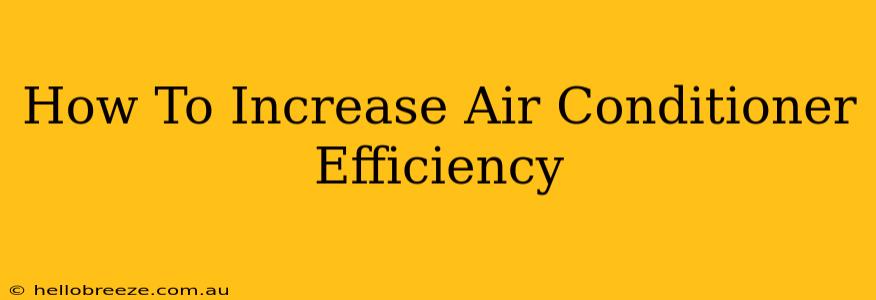Summer heat can be brutal, and your air conditioner is your best friend during those scorching days. But keeping your AC running efficiently isn't just about comfort; it's about saving money on your energy bills. A well-maintained, efficient AC unit can significantly reduce your energy consumption and environmental impact. This guide will provide practical tips on how to increase your air conditioner's efficiency and keep your home cool without breaking the bank.
Understanding AC Efficiency: The Basics
Before diving into specific strategies, let's quickly understand what factors influence your air conditioner's efficiency. The primary metric is SEER (Seasonal Energy Efficiency Ratio), which measures the cooling output relative to the energy it consumes over an entire cooling season. A higher SEER rating indicates greater efficiency.
Factors Affecting AC Efficiency:
- Age of the unit: Older AC units are generally less efficient than newer models.
- Proper maintenance: Regular maintenance is crucial for optimal performance.
- Air filter cleanliness: A clogged filter restricts airflow, forcing your AC to work harder.
- Proper insulation: Poor insulation lets cooled air escape, reducing efficiency.
- Ductwork condition: Leaky or poorly sealed ducts waste cooled air.
- Thermostat settings: Improper thermostat use can lead to energy waste.
- Window placement and shading: Direct sunlight on windows can increase the cooling load.
Top Tips to Boost Your AC Efficiency:
1. Regular Maintenance is Key:
This is arguably the single most important factor. Schedule professional AC maintenance at least once a year, ideally before the peak summer months. A technician will inspect your unit, clean coils (both inside and outside), check refrigerant levels, and ensure everything is functioning optimally. This preventative maintenance can prevent costly repairs and significantly improve efficiency.
2. Change or Clean Your Air Filters Regularly:
A dirty air filter restricts airflow, making your AC work harder and consume more energy. Change your air filter every 1-3 months, or more frequently if you have pets or allergies. You can easily check your filter and replace it yourself. A clean filter is a simple yet highly effective way to improve efficiency.
3. Optimize Your Thermostat Settings:
Programmable or smart thermostats allow you to schedule cooling based on your daily routine. Setting the thermostat a few degrees higher when you're away or asleep can save a considerable amount of energy. Consider a smart thermostat for even greater control and energy savings.
4. Seal and Insulate Your Home:
Proper home insulation prevents cooled air from escaping and outside heat from entering. Seal any air leaks around windows and doors using weatherstripping or caulk. Improving insulation in your walls, attic, and crawl spaces can dramatically reduce your cooling load.
5. Maintain Proper Ductwork:
Leaking or poorly sealed ducts can waste a significant portion of your cooled air. Have your ductwork professionally inspected for leaks and seal them appropriately. This relatively simple improvement can lead to a noticeable improvement in efficiency.
6. Utilize Window Coverings:
Direct sunlight significantly increases the cooling load on your AC. Use curtains, blinds, or shades to block sunlight during the hottest parts of the day. Consider reflective window films for even greater effectiveness.
7. Consider a Programmable Thermostat:
A programmable thermostat allows you to schedule cooling periods to coincide with your presence in the home, automatically adjusting temperatures when you're away or asleep. This eliminates the need to manually adjust the temperature, saving time and energy.
8. Regularly Clean Outdoor Unit:
The outdoor unit of your air conditioner contains coils that can become clogged with debris, reducing efficiency. Regularly clean the coils using a garden hose or leaf blower to remove dirt, leaves, and other obstructions. This simple maintenance task can significantly improve cooling performance.
Beyond the Basics: Long-Term Solutions
For significant long-term efficiency gains, consider these options:
- Upgrade to a higher SEER-rated unit: Replacing an old, inefficient AC unit with a newer, higher SEER model is a substantial investment but can offer significant energy savings over the long run.
- Invest in a heat pump: Heat pumps are highly efficient systems that can provide both heating and cooling, often resulting in lower energy costs compared to traditional systems.
By following these tips, you can significantly improve your air conditioner's efficiency, reduce your energy bills, and enjoy a more comfortable and sustainable home environment. Remember, regular maintenance is key to long-term performance and energy savings.

